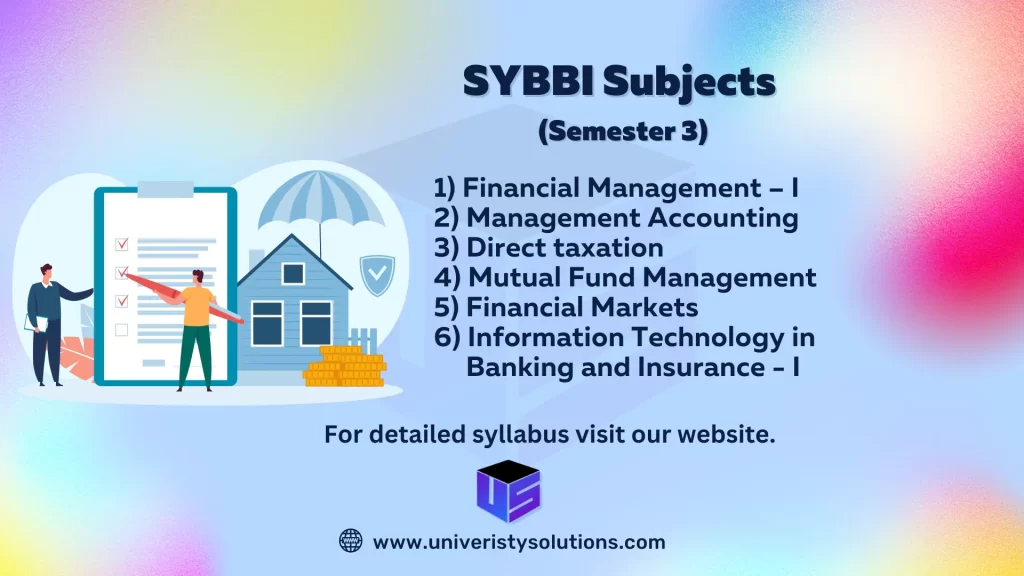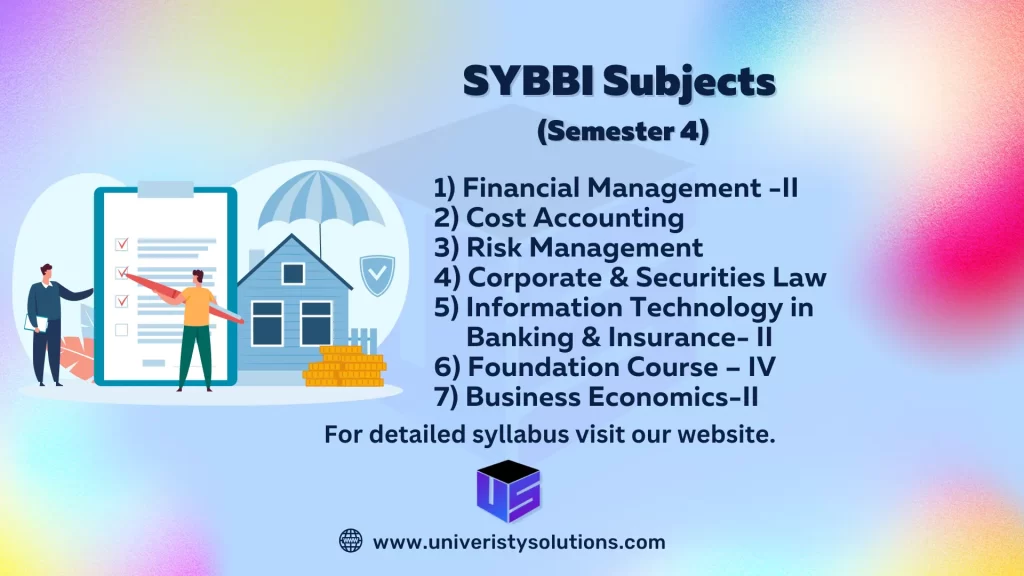
SYBBI Subjects
(Semester 3)
(SYBBI means Second Year Bachelor of Banking and Finance)
Following are the list of SYBBI Subjects (Semester III):
1) Financial Management – I
2) Management Accounting
3) Direct taxation
4) Mutual Fund Management
5) Financial Markets
6) Information Technology in Banking and Insurance – I
7) Foundation Course – III (An Overview of Banking Sector)
SYBBI Subjects
Semester 3 (Chapters)
Financial Management – I
Chapter 1 – Introduction to Finance and Financial Management
Chapter 2 – Financial Goal Setting & Time value of Money
Chapter 3 – Investment Decisions: Capital Budgeting
Chapter 4 – Financial Decisions
Management Accounting
Chapter 1 – Introduction to Management Accounting
Chapter 2 – Financial Statement Analysis
Chapter 3 – Working Capital Management
Chapter 4 – Management of Profits/Dividend Policy
Direct Taxation
Chapter 1 – Definitions and Residential Status
Chapter 2 – Heads of Income – I
Chapter 3 – Heads of Income – II
Chapter 4 – Computation of Total Income and Taxable Income
Mutual Fund Management
Chapter 1 – Introduction to Mutual Fund
Chapter 2 – Classification of Mutual Fund
Chapter 3 – Fund Selection Criteria
Chapter 4 – Financial Planning in Mutual fund
Financial Markets
Chapter 1 – Indian Financial System
Chapter 2 – Financial Markets in India
Chapter 3 – Commodity Market
Chapter 4 – Derivatives Market
Information Technology in Banking & Insurance- I
Chapter 1 – Introduction to Electronic Commerce
Chapter 2 – E-banking
Chapter 3 – MS-Office: Packages for Institutional Automation
Chapter 4 – Cyber Law & Cyber Security
Chapter 5 – Application of Information Technology in Financial Statements
Foundation Course – III (An Overview of Banking Sector)
Chapter 1 – An Overview of Banking Industry
Chapter 2 – Commercial Banking and Customer – Banker Relationship
Chapter 3 – Universal Banking and Technology in Banking sector
Chapter 4 – Microfinance and Financial Inclusion
Related Posts :
FYBBI Subjects
SYBBI Subjects
TYBBI Subjects
SYBBI Subjects
(Semester 4)

Following are the list of SYBBI Subjects (Semester IV):
1) Financial Management -II
2) Cost Accounting
3) Risk Management
4) Corporate & Securities Law
5) Information Technology in Banking & Insurance- II
6) Foundation Course – IV (Principles of Insurance)
7) Business Economics-II
SYBBI Subject
Semester 4 (Chapters)
Financial Management – II
Chapter 1 – Working Capital Management
Chapter 2 – Management of Components of Working Capital
Chapter 3 – Financial Planning
Chapter 4 – Financial Policy and Corporate Strategy
Cost Accounting
Chapter 1 – Introduction to Cost Accounting
Chapter 2 – Classification of Cost and Cost Sheet
Chapter 3 – Standard Costing
Chapter 4 – Introduction to Marginal Costing
Risk Management
Chapter 1 – Foundations of Risk Management
Chapter 2 – Capital Market Risk Management
Chapter 3 – Credit Market Risk Management
Chapter 4 – Risk Measurement
Corporate & Securities Law
Chapter 1 – Company Law – An Overview
Chapter 2 – Regulatory Framework governing Stock Exchanges as per Securities Contracts Regulation Act 1956.
Chapter 3 – Security Exchange Board Of India
Chapter 4 – The Depositories Act, 1996
Business Economics-II
Chapter 1 – Introduction to Macroeconomic Data and Theory
Chapter 2 – Money, Inflation and Monetary Policy
Chapter 3 – Constituents of Fiscal Policy
Chapter 4 – Open Economy: Theory And Issues Of International Trade
Information Technology in Banking & Insurance- II
Chapter 1 – E-banking Business Models
Chapter 2 – Induction of Techno Management
Chapter 3 – IT Applications and Banking
Chapter 4 – MS-Office: Packages for Institutional Automation
Foundation Course – IV (Principles of Insurance)
Chapter 1 – An Overview of the concept “Insurance”
Chapter 2 – Risk – Concept, Measurement and Management
Chapter 3 – Insurance Business Environment in India
Chapter 4 – Privatization of insurance business
Tips to score good marks in FYBBI Exam
- Don’t wait until the last minute to start studying: begin early. You’ll have more time to learn the topic and solve questions, the earlier you start.
- Remain arranged: Plan a study schedule and stick to it. Take time to rest and refresh during breaks.
- Regularly review your notes: Regularly reviewing back your notes will help you keep the content in your memory.
- Practice, practice, practice: By working through sample problems and completing sample tests, you can identify your areas of weakness and become familiar with the exam’s format.
- Ask for assistance if you need it: If you’re having trouble with the subject, don’t be shy to ask for assistance. You can seek advice from your teacher, a classmate, or a tutor.
- Get a good night’s sleep: The night before the exam, be sure to get lots of rest. A mind that has got enough sleep is better prepared to memorize and recall information.
- Arrive early on exam day: Arrive early on the day of the exam to give yourself time to settle your worries and mentally prepare.
- Stay focused during the exam: Avoid being distracted during the exam by remaining focused. Take a deep breath and return your attention to the activity at hand if you realize that your mind is roaming.
- Don’t waste too much time on any one question: keep an eye on the time. If you start to struggle, leave it and return to it later.
- Review your exam after you’re done: After you’re finished, review your paper for a while. By doing this, you’ll be able to correct any mistakes you may have made and provide any answers you’re not sure about.
Pingback: FYBBI Subjects - Mumbai University | Semester 1 & 2 - University Solutions
Pingback: TYBBI Subjects - Mumbai University | Semester 5 & 6 - University Solutions
Pingback: FYBBI Syllabus | Semester 1 & 2 -Mumbai University - University Solutions
Pingback: SYBBI Syllabus | Semester 3 & 4 | Mumbai University - University Solutions